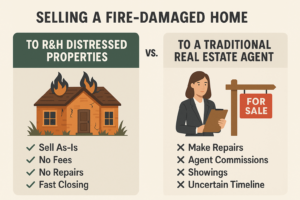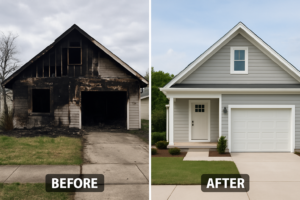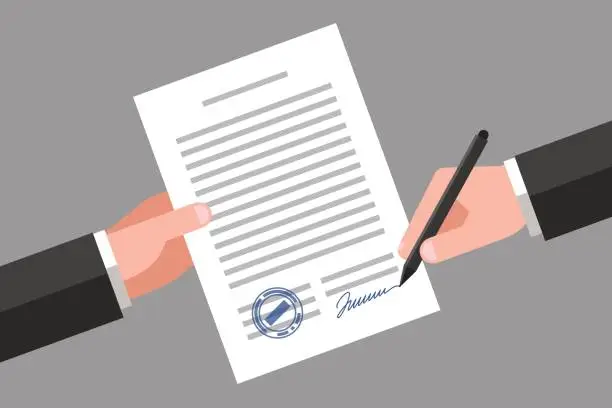
When disaster strikes in the form of a house fire, the aftermath can be overwhelming. Homeowners are often left wondering what to do with their fire damaged property, especially when faced with costly repairs, insurance headaches, and emotional stress. One of the biggest questions becomes, “How can I sell fire damaged house?” While navigating the real estate market with a damaged home isn’t easy, it’s certainly not impossible—with the right approach, selling a fire damaged property can still be a viable, stress-free option.
The Challenge of a Fire Damaged Home
A house touched by fire, has minor house fire damage, or that has sustained fire damage, presents unique challenges. The evident fire damage is just the tip of the iceberg. Underneath, there may be hidden structural issues, smoke damage that’s hard to eradicate, and potential issues with electrical systems that can scare away potential buyers. These challenges can substantially reduce the market value and appeal of the property.
Curious what we’d offer for your fire damaged house? Want to know its current value? Fill out the quick form below — there’s no obligation, just a fast, honest answer from a local home buyer you can trust.
Exploring Your Options

Broadly, homeowners have two main avenues when selling a fire damaged house:
- List with a Real Estate Agent: This traditional route involves repairing the house to make it market-ready, then listing it for potential buyers to see. But as you might imagine, the journey is often long, and the costs can add up quickly.
- Sell to Cash Home Buyers: Companies like R&H Distressed Properties offer a lifeline to homeowners looking for a quick, hassle-free sale. Selling “as is” for cash can often mean a faster, simpler process with no need for repairs.
Throughout this guide, we’ll dive deep into both options, providing you with the insights needed to make the best decision for your unique situation.
Understanding the Impact of Fire Damaged Property

Fire, while being a primal force of nature, leaves a profound impact on properties it touches. The aftermath is more than just charred walls and soot-covered furniture. To fully comprehend what selling a fire damaged house entails, it’s essential first to grasp the extent and nuances of fire damage itself.
Defining Fire Damage and Its Types
When we talk about a ‘fire damaged house’, it’s a collective term that can encompass a variety of issues:
- Visible Damage: This includes charred walls, melted fixtures, and other overt signs of damage that are immediately noticeable.
- Smoke Damage: Even if only a small portion of the house caught fire, smoke can permeate throughout the property, embedding its residue into walls, carpets, and other fixtures. Smoke damage isn’t just an aesthetic concern; it poses health risks and can emit a persistent odor.
- Structural Damage: Not always visible to the naked eye, but potentially the most dangerous. The intense heat of a house fire can weaken the foundation, walls, and support beams, potentially making the home unsafe.
- Water and Chemical Damage: Often overlooked, but the water and chemicals used by the fire department to douse the flames can cause their own form of damage. This can lead to mold growth, wood rot, and other complications if not addressed.
The Emotional and Financial Repercussions
Beyond the tangible damage, homeowners face emotional trauma. Personal belongings with sentimental value may be lost forever. Memories built over years can get overshadowed by the event. The fire’s aftermath is not just about repairing fire damage but also about healing from the emotional distress it brings.
Does House Insurance Cover Fire Damage?
Yes, homeowners insurance typically covers fire damage—but coverage can vary. While a policy may help pay for repairs and lost belongings, it might not cover the full cost to restore everything. Insurers often reimburse based on actual cash value (which factors in depreciation) rather than full replacement cost. Even after repairs, a fire-damaged home may lose value, as buyers tend to see it as a higher-risk property.
Key Takeaways from the National Fire Protection Association
The National Fire Protection Association (NFPA) reports that residential fires are more common than homeowners might think. While modern homes are built with safety measures, the risk remains. Understanding the frequency and common causes can provide insights into how potential buyers might view fair market value of fire damaged homes.
Why This Understanding Matters
Knowledge is power. By fully understanding the depth and breadth of fire damage, homeowners are better equipped to make informed decisions. Whether it’s negotiating with an insurance company, or deciding on repair and costs involved, having a comprehensive grasp of the fire damage’s impact can lead to more favorable outcomes.
Selling A Fire Damaged House
Selling Fire Damaged Property through a Real Estate Agent

When faced with the prospect of selling a fire damaged house, many homeowners naturally think of the traditional route: enlisting the services of a real estate agent. While realtors bring expertise and market knowledge to the table, it’s essential to understand the specifics of how this option might play out with a fire damaged property.
Market Value vs. Actual Cash Value
Understanding these terms is crucial when setting the selling price for a fire damaged home:
- Market Value: This is the price a buyer is willing to pay for the property under current market conditions. For homes with fire damage, this number can be significantly lower than comparable properties in good condition.
- Actual Cash Value (ACV): It’s the market value minus depreciation, which takes into account the age and condition of the property. In the case of fire damage, the ACV can be considerably diminished, making it challenging to determine a fair selling price.
The Hidden and Overt Costs of Listing
Selling a fire damaged home via a real estate agent can be more costly than many homeowners anticipate:
- Repair Costs: To make the property more appealing to potential buyers, the need to repair fire damage may be necessary. The cost to repair fire damaged house could be substantial. This could involve fire restoration, fixing structural damage, fire damage restoration, or addressing issues like mold resulting from water used to extinguish the fire.
- Closing Costs: Standard in most sales, these can include title searches, attorney fees, and other administrative costs.
- Realtor Commission: Typically ranging from 5% to 6% of the selling price, this can be a substantial amount, especially when the home’s market value has been reduced due to fire damage.
Getting started is easy — just fill out the form below…
The Waiting Game
Even after making necessary repairs, fire damaged homes can linger on the market:
- Stigma of Fire Damage: Even when repaired, some buyers remain hesitant about purchasing a burned house with a history of fire damage. This can prolong the time it takes to secure a buyer.
- Lengthy Negotiations: Due to the perceived risks, potential buyers may present low-ball offers, leading to extended negotiations.
Navigating Disclosure and Regulations
Honesty is paramount when selling a fire damaged property:
- Mandatory Disclosure: Sellers are often legally required to disclose fire damage to potential buyers, regardless of repairs made. This transparency can sometimes deter potential buyers.
- Safety Inspections: Local regulations might necessitate safety inspections before a sale, ensuring that the property meets current safety standards post-repair.
The Realtor’s Role in the Process
A skilled real estate agent can be invaluable when navigating these challenges:
- Market Insights: They can provide data on comparable sales and guide the homeowner on setting a realistic price.
- Marketing Expertise: Good agents will leverage various platforms to showcase the home, mitigating some of the challenges associated with its fire-damaged history.
- Negotiation Skills: With their experience, they can help in getting the best possible price, even with the property’s challenges. (Learn more about selling without a realtor)
Selling Directly to Cash Home Buyers: The R&H Distressed Properties Advantage

For homeowners seeking a streamlined, efficient, and often more advantageous route, selling directly to a cash buyer, or cash home buyers, is an enticing option. Companies like R&H Distressed Properties buy fire damaged houses. They specialize in these kinds of transactions, offering benefits that traditional real estate routes can’t match. Let’s delve into the unique advantages they bring to the table.
Immediate Cash Offers
The most prominent allure of cash home buyers:
- Quick Turnaround: Forget waiting for potential buyers to get their mortgage approved. R&H Distressed Properties can make a fair cash offer in a fraction of the time.
- Simple Transactions: Cash transactions eliminate many of the bureaucratic hoops associated with traditional property sales, expediting the process.
Sell “As Is” – No Repairs Needed
The convenience of this can’t be overstated:
- Cost Savings: Avoid the hefty bills associated with repairing fire damage or other costly repairs. R&H Distressed Properties buys homes in their current condition.
- No Aesthetic Pressures: Whether it’s smoke damage or charred walls, there’s no need to invest in cosmetic fixes to make the property market-ready.
Eliminate Typical Sale Costs
Another significant advantage of selling to cash home buyers:
- No Commission: By sidestepping the traditional realtor route, you won’t need to carve out a chunk of the sale price for commission.
- Minimal Closing Costs: R&H Distressed Properties often takes on the majority, if not all, of the closing costs, saving sellers additional money.
Working with Out-of-State Owners
A standout feature that traditional real estate transactions often struggle with:
- Seamless Transactions: Whether you’ve inherited a property or moved out of state post-fire, R&H Distressed Properties can facilitate the sale without requiring you to be present physically.
- Remote Communication: Utilizing modern tools and technology, they ensure the entire process – from initial consultations to final paperwork – is manageable remotely.
No Obligation Offers
R&H Distressed Properties stands out with its transparent approach:
- Freedom to Choose: After receiving their cash offer, homeowners are under no obligation to accept. This provides flexibility and decision-making power to the seller.
- Transparent Dealings: Expect clear communication and a breakdown of how the offer was calculated, ensuring homeowners can make an informed decision.
A Hassle-Free Sale

With R&H Distressed Properties, the entire process becomes less daunting:
- No Home Showings: Skip the stress of having strangers tour your home at inconvenient times.
- Flexible Closing Date: They work on your timeline, whether you need a fast sale or a delayed closing date for personal reasons.
The R&H Distressed Properties advantage shines brightly when considering the challenges associated with selling a fire damaged house. Their holistic approach, combined with the benefits of a cash offer and the ability to work with out-of-state homeowners, positions them as a go-to solution for those seeking a stress-free sale of fire damaged properties. In the face of adversity, having real estate investors like R&H Distressed Properties can make all the difference. (We Buy Houses Florida!)
Understanding Insurance Policies & Claims

Dealing with a fire damaged house is not just about making the right selling choice; it’s also about navigating the complex world of insurance policies and claims. This process, while crucial, can sometimes be overwhelming for homeowners. Let’s break it down step by step, ensuring you maximize the benefits from your insurance while minimizing the headaches.
Types of Coverage
The first step in navigating insurance claims is understanding the type of coverage you have:
- Replacement Cost: This is a policy that will pay for replacing your property without deducting for depreciation. It aims to restore your property to its pre-fire condition.
- Actual Cash Value: This considers the property’s depreciation. So, while it might cost more to replace an item than its actual cash value, this policy will only pay out the latter amount.
- Land Beneath Your Home: Most policies don’t factor in the value of the land beneath your home. Even in cases of severe fire damage, the land remains, and its value typically remains unaltered.
Filing a Claim – The Initial Steps
Acting promptly and following the right procedures is vital:
- Contact Your Insurance Company: Immediately after a fire, get in touch with your insurance company. This not only kickstarts the claim process but can also help you get guidance on immediate repairs or temporary housing, if covered.
- Review Your Policy: Go through your policy documents to understand what’s covered and the procedures to follow. This will help you align your expectations.
- Document Everything: Take photographs of the damage, list down damaged items, and keep a record of all communication with the insurance company. This will be invaluable during the claims process.
Working with an Insurance Adjuster
An insurance adjuster plays a critical role in determining the compensation you receive:
- Adjuster’s Visit: The adjuster will inspect the fire damage to assess the insurance company’s liability.
- Present Your Documentation: Sharing your records and documentation can help ensure you receive a fair evaluation.
- Negotiate If Needed: If you believe the adjuster’s estimate is lower than expected, don’t hesitate to negotiate. Sometimes, bringing in third-party assessments can aid this process.
Understanding Policy Limitations and Exclusions
Insurance policies often come with clauses that can affect payouts:
- Deductibles: This is the amount you’ll need to pay out-of-pocket before your insurance covers the rest. Be aware of your deductible as it can impact your overall claim amount.
- Policy Limits: Each policy will have maximum limits on the payout. Ensure you know these limits, especially if the fire damage is extensive.
- Exclusions: Not all types of damage may be covered. For instance, if electrical systems contributed to the fire, and they were not maintained, the insurance might exclude that damage.
The Role of Insurance in Selling a Fire Damaged House
While insurance claims can provide financial relief, they may not always cover the full extent of the property damage, or the potential decrease in home value. This is where solutions like selling to R&H Distressed Properties can complement the insurance payout, providing homeowners with a comprehensive financial solution.
Navigating the maze of insurance after a house fire can be challenging. By understanding your policy, acting promptly, and exploring all avenues – including selling options – homeowners can find the best path to recovery and financial stability.
How R&H Distressed Properties Works

Choosing to sell a fire damaged house is one thing, but understanding the process of selling it to a specialized buyer like R&H Distressed Properties provides clarity and confidence. Here, we outline the step-by-step journey with R&H Distressed Properties, ensuring transparency and laying out the seamless experience they offer. Sell fire damaged house Alaska and sell fire damaged house Delaware today!

R&H Distressed Properties stands out in its commitment to simplifying the sale of fire damaged homes. They’re rehabilitating fire damaged houses near you, even if using your homeowner’s insurance company. Their approach is built on transparency, fairness, and understanding the unique challenges homeowners face in such circumstances. Whether it’s previous fire damage for your house, the convenience of selling sell fire damaged house “as is” or the speed of a cash transaction, partnering with R&H means a hassle-free and advantageous selling experience. Ready to sell fire damaged house California?
(Read more about selling a house without inspections)
Preparing Your Fire Damaged Property for Sale

Even when selling a fire-damaged home, some preparation can make a significant difference in the selling process. While companies like R&H Distressed Properties buy houses “as is,” ensuring your home is in the best possible condition can help create a smoother transaction. Let’s explore the steps you can take.
Safety First With Fire Damaged Houses
- Consult the Fire Department: Before entering your property, get a clearance from the local fire department. This ensures that the structural integrity of the home is sound and it’s safe to enter.
- Turn Off Utilities: Ensure all utilities, especially gas and electricity, are off to prevent any further complications or hazards.
How to Price a Fire Damaged House

Pricing a fire damaged home isn’t as straightforward as a traditional sale—but it can be done methodically. The key is understanding both the damage and the value potential after repairs. Here’s how to approach it:
1. Assess the Extent of the Damage
Start by evaluating how much of the home was affected:
- Cosmetic damage like smoke stains, soot, or minor burns
- Structural damage such as roof issues, damaged framing, or compromised walls
- Systemic damage to plumbing, electrical, and especially HVAC systems and ductwork, which often need full replacement after a fire
Bring in a licensed contractor or fire restoration professional to get an accurate picture of the damage.
2. Get a “Post-Repair” Market Value
Look at comparable homes in your area that have not been damaged by fire. These comps will help you determine what your house could sell for after it’s fully repaired—this is known as the after-repair value (ARV).
3. Calculate the Full Repair Costs
Once you have a repair scope, get detailed estimates. Be sure to include:
- Demolition and debris removal
- Structural repairs (walls, roof, framing)
- Smoke and soot remediation
- Replacement of HVAC system and ductwork
- Interior finishes (flooring, drywall, cabinets, etc.)
- Permits, inspections, and possible city code upgrades
- A contingency buffer for unexpected issues (10–20% is standard)
4. Factor in Buyer Risk and Timing
Buyers—especially investors or cash buyers—will take into account the time, effort, and risk involved in restoring a fire damaged home. Because of this, offers may come in lower than you’d expect from a standard sale. The more damage there is, the more discounted the price tends to be.
Documentation and Assessment
- Photograph Everything: Before any cleanup, take detailed photographs of all rooms and the damage. This serves as evidence for insurance claims and provides potential buyers with a clear view of the state of the property.
- Assess Structural Damage: While in-depth repairs might not be on your agenda, knowing the extent of structural damage can aid in pricing and negotiations.
Clearing Out Debris
- Personal Belongings: Salvage any personal belongings that survived the fire. This can include important documents, jewelry, and other valuable items.
- Hire Professionals: If your budget allows, consider hiring a fire damage restoration company. They can efficiently clear out debris, remove soot, and handle smoke damage, making the house more presentable.
Minimize Smoke and Odor
- Ventilate: Open all windows and doors to allow fresh air to circulate. This helps reduce the strong smell of smoke.
- Air Purifiers and Dehumidifiers: Utilizing air purifiers can further minimize smoke odors. Dehumidifiers can assist in drying out damp areas, preventing mold growth.
Basic Cosmetic Touches
- Clean Up: A basic cleanup can work wonders. Clear pathways, wipe away soot from surfaces, and remove any fallen debris.
- Garden and Exteriors: Even if the house’s interior is damaged, keeping the garden tidy or cleaning up the exterior can improve the property’s curb appeal.
Transparency with Potential Buyers
- Full Disclosure: Be honest about the extent of the damage. Highlight areas that suffered only a small portion of damage and be transparent about those that need major repairs.
- Offer Inspection Reports: If you’ve had any inspections done post-fire, typically from your insurance company, offer these reports to potential buyers. It increases your credibility and helps them make an informed decision.
While preparing a fire-damaged home for sale might seem daunting, these steps can make the process more manageable. Remember, the goal is to present the property in the best light, ensuring a faster sale and potentially better offers. However, if the preparation feels overwhelming, companies like R&H Distressed Properties offer a hassle-free solution by purchasing homes in their current “as is” condition.
Conclusion: Making Informed Decisions in Difficult Times

Selling a fire-damaged house is undoubtedly a challenging endeavor, fraught with emotions and logistical hurdles. However, understanding the nuances of the process, from recognizing the full impact of fire damage to considering different selling avenues, can make all the difference.
Opting for the traditional route with a real estate agent might seem familiar, but it comes with its own set of challenges and uncertainties. On the other hand, selling directly to specialized cash home buyers like R&H Distressed Properties offers a seamless, transparent, and expedited process, especially beneficial for out-of-state owners and those keen to move forward quickly.
Moreover, while preparing your burned houses or home for sale can potentially boost its appeal, it’s comforting to know that there are reliable buyers willing to purchase properties in their “as is” condition, eliminating the need for costly repairs or intense preparations. Even if others have previous fire damage buying, we buy as-is fast. Sell fire damaged house Georgia, sell fire damaged house Kansas, sell fire damaged house Missouri, sell fire damaged house Alabama, sell fire damaged house Arizona, sell fire damaged house South Dakota, sell fire damaged house Washington, sell fire damaged house Nevada, sell my fire damaged home Austin, sell fire damaged house Connecticut, sell fire damaged house Maryland, sell fire damaged house Indiana, sell fire damaged house Maine, sell fire damaged house Nebraska, sell fire damaged house Oklahoma, sell fire damaged house South Carolina today, sell fire damaged house North Carolina, sell fire damaged house Florida, sell fire damaged house Kentucky, and sell fire damaged house Massachusetts, sell fire damaged house Arkansas, sell fire damaged house Texas, sell fire damaged house Hawaii, sell fire damaged house New Hampshire, fire damaged house Arkansas, sell fire damaged house Idaho, sell fire damaged house Illinois, sell fire damaged house Minnesota, sell fire damaged house Iowa, sell fire damaged house Oregon, sell fire damaged house Vermont, sell fire damaged house Washington DC, sell fire damaged house Colorado, sell fire damaged house Louisiana, sell fire damaged house Minneapolis, sell fire damaged house New York, sell fire damaged house Montana, sell fire damaged house Ohio!
In the end, the most important thing is to make a decision that aligns with your circumstances and needs. Every homeowner’s situation is unique, and the best choice is always the one that offers peace of mind and the best path forward. R&H Distressed Properties is there to assist, offering a helping hand during tough times, ensuring homeowners can transition to the next chapter of their lives with ease and confidence. They will buy a house with fire damage easy and effortlessly. Have a difficult house you need to sell? Read here.
Remember, life’s unexpected events, like house fires, test our resilience, but with the right knowledge and partners by our side, we can navigate them with grace and optimism. Whether the home fire damaged the entire house, or just the garage, we’re here to provide you an easy option to sell your fire damaged house fast. Remember, if you’re looking for someone who buys fire damaged homes near me, reach out to R&H Distressed Properties today. Whatever route you choose, may your journey to selling your fire-damaged house be smooth and fulfilling.

